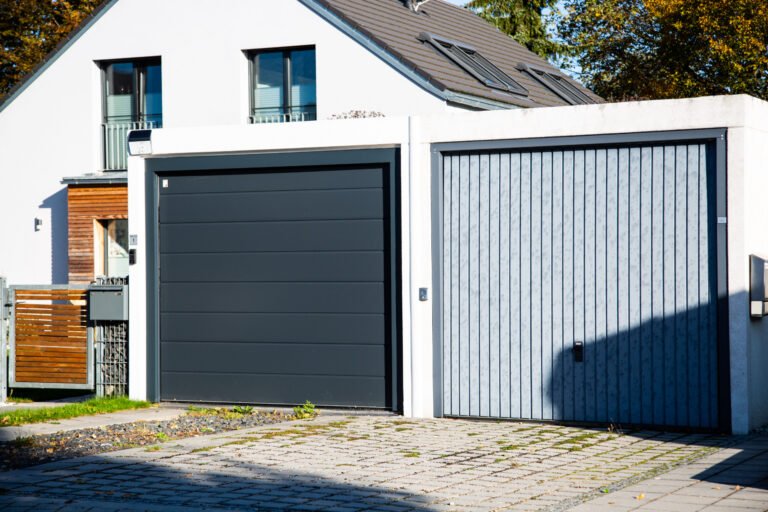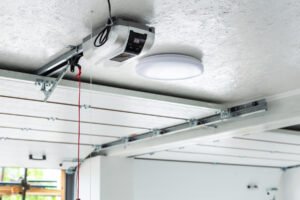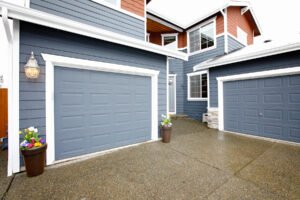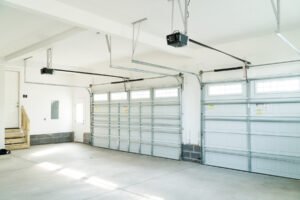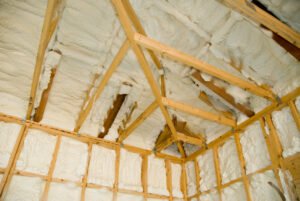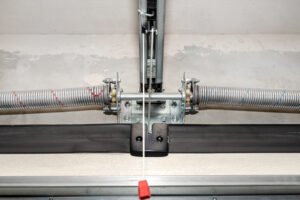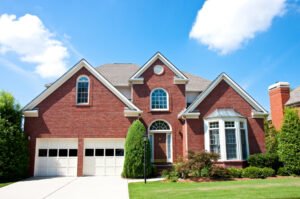Garage doors screen and secure the garage, but they can be really demanding in terms of time, labor, and cost. Warped or rusty shutters not only hamper access but are also unsightly. So, how do we ensure optimal function and proper decor for a new garage door? By using the right garage door materials!
Garage door materials play a vital role since they impact the door’s longevity, weather resistance, and mold to your facade design. So, here is a list of 7 garage door materials to suit different garage door types and styles and some helpful tips for picking the best material!
Most Popular Materials for a Trendy Garage Door
Different door materials have different properties concerning heat resistance, weight, longevity, and adaptability to garage door openers. While some natural wood doors are incredibly sturdy and insulating, others, like aluminum garage doors or steel doors, are more lightweight and easy to automate.
So, let’s analyze some more factors and conclude the best garage door material for your garage.
1. Steel Garage Doors

What Is It: Steel garage doors are welded steel panels that are further treated using galvanized zinc baths or anti-rust solutions to enhance their durability.
Steel doors are lightweight, customizable, low-maintenance, and affordable. They are perfect for daily use and are also available in different polished, vintage, and oiled finishes to suit various ethnic and modern home decor.
Furthermore, though a steel door does not retain heat, it holds onto heavier cellulose or foam garage door insulation and becomes energy-efficient. Plus, they have different thicknesses.
While a 24-25 gauge steel garage door offers more protection and insulation, a 27-28 gauge steel garage door is inexpensive and suits detached garages or workshop spaces. Plus, heavier steel garage doors do not catch fungus or mold and can be raised, recessed, or paneled as you choose.
Best Suited For: Sectional doors, Sliding doors, Rolling, Canopy, or a Retractable Overhead door or Commercial door
| Standard Weight | 110 – 140 pounds |
| Average Cost | $500 – 1800, depending on the door type and design |
| Preferred Climate | Hot and Dry or Temperate |
| Average Lifespan | 20 – 25 years |
| Decor Style | Modern, Vintage, Industrial, and Carriage house |
Pros:
- Low maintenance and Durable
- Comes in different sizes and finishes
- Easily customizable
- Adaptable with automated door openers
- Affordable yet Longlasting
- Easy garage door installation and repairs
Cons:
- Susceptible to warps and dents
- Poor insulation
- Can sag and corrode in humid or coastal climates
Spray regular lubricating oil or motor oil onto the steel door hinges, clamps, or door springs to ensure smoother, noise-free operations.
2. Wood Garage Doors

What Is It: Wood garage doors are compressed and glued wood panels, veneers, or plywood sheets that are coated with wax or oil to protect from moisture and pests.
Wooden garage doors are incredibly thick, sturdy, and have a natural, grainy appearance with a hint of luxury. These doors might be expensive for a one-time investment but offer good insulation and save energy costs in the long run.
Plus, these offer enough room for niche or concealed ambient lights and glass panels to enhance your curb appeal instantly. However, this material is best suited for mild climates and might fade, warp, rot, or discolor with extreme temperature changes or humidity. It requires high maintenance, so you’ll need to prime, sand, repair, and reglaze wood doors repeatedly.
Best Suited For: Swing-out doors, Side-hinged, Carriage, Mission, or French doors
| Standard Weight | 300 – 500 pounds |
| Average Cost | $1000 – 5000 depending on the design |
| Preferred Climate | Temperate, Mild Climate or Sloping Terrain |
| Average Lifespan | 30 – 40 years |
| Decor Style | Traditional, Classical, Farmhouse, Mediterranean |
| Types of Wood | Alder, Cedar, Oak, and Redwood |
Pros:
- Earthy, Rustic look and Easily Customizable
- Thick and Excellent natural insulation
- Variety of Finishes, Textures, and Grains
- Allows room for accent lights, windows, and decorative hardware
Cons:
- Heavy and Difficult to operate manually
- Warps, Rots, or Deforms due to moisture
- Expensive and Require maintenance
- Labor-intensive garage door repair or replacement
Always fill all the minor holes in your wood garage doors with self-sealing wood putty and use an air dryer to set it properly to prevent bacterial invasion.
3. Wood Composite or Faux Wood Garage Doors
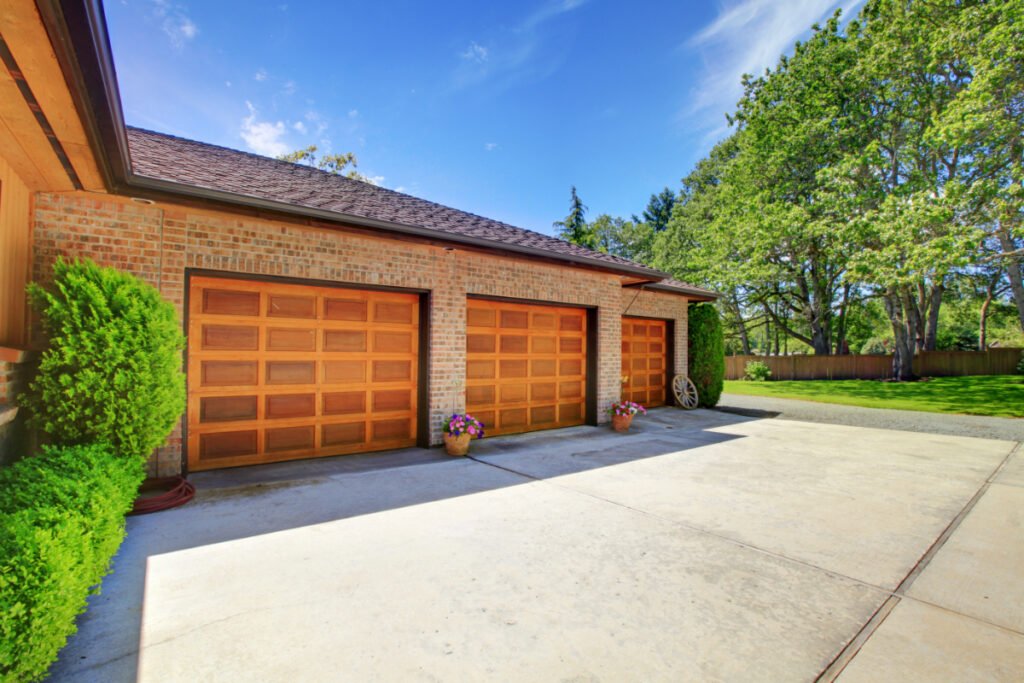
What Is It: Wood composite doors are medium or high-density fiberboard sheet panels with vertical grooves and a sandwiched polystyrene insulation that mimics faux wood.
Wood composite garage doors are lightweight, sturdy, and more resistant to mold, mildew, and debris than traditional wooden doors. They are also highly customizable and can be stained or painted with any latex or faux wood paint to suit your stone, cladding, or brick house exterior.
However, these doors are not naturally insulating and need to be refinished with garage door insulation. Overall, wood composite resists splitting and warping and can withstand heavy use. It’s suitable for dry, humid, and tropical climates and is recyclable and sustainable!
Best Suited For: Craftsman, Mission, or Carriage doors or Tilt-up or Canopy doors from any Overhead door company
| Standard Weight | 180 – 250 pounds |
| Average Cost | $900 – 3000 |
| Preferred Climate | Works in all climates |
| Average Lifespan | 40 – 50 years |
| Decor Style | Craftsman, Modern, Minimal, or Carriage house |
Pros:
- Lightweight, Durable, and long-lasting than wood doors
- Easy cleaning and low maintenance
- Resists mold, mildew, and rust effectively
- Customizable and Sustainable
Cons:
- Needs additional garage door insulation
- Lacks the grains, texture, and rich finish of a conventional wood garage door
- Might crack or chip over time
- Quite expensive
Coat your wood composite garage doors with a good-quality waterproofing solvent or use durable garage door bottom seals to protect them from moisture and chipping.
4. Aluminum Doors

What Is It: Aluminum doors are simple, grooved, or paneled aluminum sheets with additional glass or vinyl reinforcements to help resist the wind load and provide better insulation.
Aluminum garage doors are highly lightweight, long-lasting, and naturally resistant to rust and corrosion. These are sleek, add a crisp, contemporary ambiance, and come in 200+ colors and finishes to suit different facades.
Another perk is that an aluminum door can have transparent, translucent, or opaque panels and can be reglazed or powder-coated if needed.
However, this door material is fragile and might dent, crack or warp due to heavy moisture or air pressure. And it doesn’t have self-insulation and cannot support heavier foam or cellulose panels. Thus, with aluminum garage doors, you might require additional indoor air conditioning or garage ceiling insulation.
Best Suited For: Roller, Overhead, Tilt-up, Canopy, or Retractable Doors
| Standard Weight | 90 – 120 pounds |
| Average Cost | $600 – 1500 |
| Preferred Climate | Hot and Dry or Arid |
| Average Lifespan | 15 – 20 years |
| Decor Style | Minimal, Industrial, Contemporary |
Pros:
- Resistant to rust, corrosion, and mildew
- Customizable and Versatile
- Allow more natural light in the garage
- Low maintenance
Cons:
- Low insulation and Least energy-efficient
- Absorbs water and moisture
- Low durability and easy denting
- Can be broken easily and needs stronger garage door locks for security
Never use steel wool, coarse scrub pads, or abrasive cleaners on any aluminum garage door, as it might scratch and discolor the surface. Instead, use lukewarm, soapy water and soft-bristled brushes to remove the grime and debris.
5. PVC or Vinyl Garage Doors
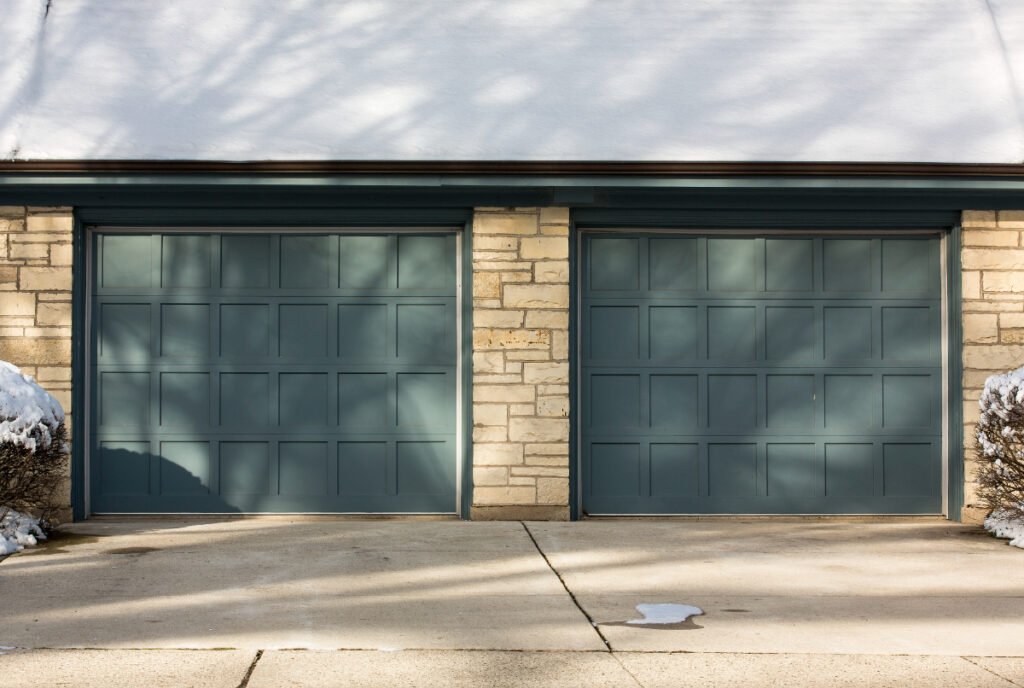
What Is It: Vinyl garage doors are simple steel or wood-framed shutters packed with PVC panels and polyurethane insulation batts that enhance their durability and protect them from moisture.
A vinyl garage door resists salt water, humidity, and dust, making it the right choice for any residential garage door along the coasts or the desert. This material is not only affordable and customizable but also adds excellent insulation. It repels termites and pests and uses recyclable fillers with a low carbon footprint.
However, due to its thin, slender sections, a vinyl garage door might chip, crack, and discolor, and it might not look aesthetic or finished. However, it can be painted or reglazed to boost its curb appeal and is undoubtedly the most universally accessible garage door material.
Best Suited For: Sliding, Folding, Tilt-up, Canopy, or Sectional doors
| Standard Weight | 80 – 90 pounds |
| Average Cost | $600 – 1200 |
| Preferred Climate | Humid, Warm, and Coastal |
| Average Lifespan | 12 – 17 years |
| Decor Style | Eclectic, Zen, Industrial, or Countryside |
Pros:
- Durable and Anticorrosive
- Doesn’t discolor because of chemicals, minerals, and abrasive cleaners
- Extremely low maintenance
- Lightweight and low cost
- Easy to Install, Repair and Replace
- Recyclable and Environment-friendly
Cons:
- Brittle and cracks easily
- Might discolor and melt due to UV rays
- Not that aesthetic
- Poor strength and security
Use a 1:3 diluted vinegar and water solution to clean harsh stains or dust from your vinyl door. Dab it immediately with a dryer sheet to prevent discoloration.
6. Fiberglass Garage Doors

What Is It: Fiberglass doors are nothing but steel-framed panels filled with glass-reinforced plastic boards and a thin layer of polyurethane coat for effective insulation against heat.
Fiberglass garage doors do not shrink, warp or deform and offer the highest weather resistance compared to other materials. These doors are pretty thin and lightweight but have higher strength.
Additionally, this material is slightly translucent and allows more natural light into the space. And since they resist salt water and moisture, they are the right tap for humid and coastal areas.
However, fiberglass doors are pretty noisy and might be damaged due to high winds and broaden the door gaps with time. They might also discolor and lose their shine due to heavy sunlight exposure. Still, fiberglass offers superior insulation in warmer climates and keeps your garages cool and well-ventilated.
Best Suited For: Rolling, Canopy, Retractable, Sliding, and Paneled doors
| Standard Weight | 75 – 85 pounds |
| Average Cost | $500 – 2000 |
| Preferred Climate | Humid, Warm and Coastal |
| Average Lifespan | 15 – 20 years |
| Decor Style | French, Countrystyle, Farmhouse, or Bohemian |
Pros:
- Doesn’t warp, deform or corrode due to moisture
- Allows more natural light in the interior
- Doesn’t expand or contract due to heat
- Low maintenance
- Affordable and Lightweight
Cons:
- Difficult to Repair or Replace
- Brittle and can break due to high winds
- Can turn yellow over time
Spray a 1:4 diluted vinegar solution to scrub off all the mold, mildew, and debris from the surface of any fiberglass garage door, and then seal it with liquid or paraffin wax to retain its shine.
7. Glass Garage Doors

What Is It: Glass garage doors are thick, semi-transparent panels of tempered, obscure, or tinted glass fitted in sleek aluminum frames and coated with thin, polycarbonate films to enhance their durability.
A glass garage door is modern, chic, and aesthetic. It allows clear, panoramic views of the surroundings and brings more natural light to the space. Moreover, it protects from dust and pests and is an excellent chemical, stain, and soil-resistant material.
However, glass garage doors are pretty brittle and may break or scratch with heavy winds, rain, snow, or noise. Plus, they have negligible insulation and require another insulated garage door or screen as a buffer to retain heat efficiently.
Best Suited For: Screen, Rolling, Sectional, French, and Carriage Style doors
| Standard Weight | 250 – 300 pounds |
| Average Cost | $1000 – 2000 |
| Preferred Climate | Dry and Sunny |
| Average Lifespan | 10 – 15 years with proper maintenance |
| Decor Style | French, Carriage house, Contemporary and Minimal |
Pros:
- Decay, Moisture, and Pest resistant
- Allow more natural light into the space
- Energy-efficient and well-ventilated
- Strong, Rigid, and Remain in place if broken
- High-end and Luxurious
Cons:
- Poor insulation and might increase heating costs
- Transparent and don’t offer privacy
- Difficult to DIY install or repair and need a professional garage door service
- Brittle and not child-friendly
Use a non-abrasive glass cleaner and towel to polish your glass panels and rinse them with a mild detergent solution to remove all the dust and grime.
Comparison of Popular Garage Door Materials
| Parameter | Steel | Wood | Composite | Aluminum | Vinyl | Fiberglass | Glass |
| Cost | Low | High | High | Low | Low | Low | Moderate |
| Weight | Light | Heavy | Heavy | Light | Light | Light | Heavy |
| Insulation | No | Yes | No | No | Yes | Yes | No |
| Security | High | High | High | Moderate | Low | Moderate | Low |
| Decor | Mixed | Traditional | Craftsman | Industrial | Country | Farm house | French |
| Rust resistance | Low | High | High | High | High | High | High |
| Weather resistance | Medium | Moderate | High | Low | High | Moderate | Low |
Tips for Picking the Right Garage Door Material for Your Garage
- Always consider the material’s total maintenance and energy cost in the long run and pick the one that suits your climate. For example, wood doors are expensive at first but can insulate well and save heating costs in temperate zones.
- Wooden, aluminum, or steel garage doors are great to boost the curb appeal in front-facing garages, whereas fiberglass doors are not that appealing but might secure a detached garage on a budget.
- A vinyl or fiberglass door is the best tap for coastal and humid zones, whereas wood or steel ones are perfect for dry, windy climates.
- Pick sturdier wood-composite, metal, or wooden garage doors that hold onto thicker foam insulation for cold and snowy regions of the USA.
- Pick lightweight steel, aluminum, or vinyl doors for rolling shutters, and go with heavier glass, wood, or composite panels for side-hinged or swing-out doors.
- Choose scratch and dent-resistant, faux-wood, composite, or vinyl doors if you have children or pets at home.
Should You Galvanize Metal Garage Doors?
Yes, steel or aluminum garage doors should be galvanized in a hot zinc bath to prevent moisture corrosion and weathering and make them last longer. And you can further paint them or top them up with polyester coating to prevent molds and mildew.
Which Is the Cheapest Garage Door Material?
Fiberglass garage doors are not only the cheapest to purchase but also lower the maintenance, polishing, and reglazing costs extensively. However, they stain easily and might need frequent professional cleaning, which might be costly.
Do Garage Doors Corrode or Rust?
Yes, alloyed steel or mild steel garage doors might rust on exposure to rain, humidity, or sea salts. In such cases, coat them with a polyurethane solution, rinse them with anti-rust liquids, or paint them to avert further rusting.
Garage door materials play a key role in maintaining the durability and aesthetics of your garage. While thicker wooden garage doors are certainly the most durable and insulative, lightweight fiberglass garage doors are easily accessible by the elderly and are preferred for manual operations.
Thus, the suitable garage door material depends on your preference and ease of use. You can refer to our comparison table to get an overview. You can also use the same materials to build different garage door alternatives and secure your garage on a budget.

